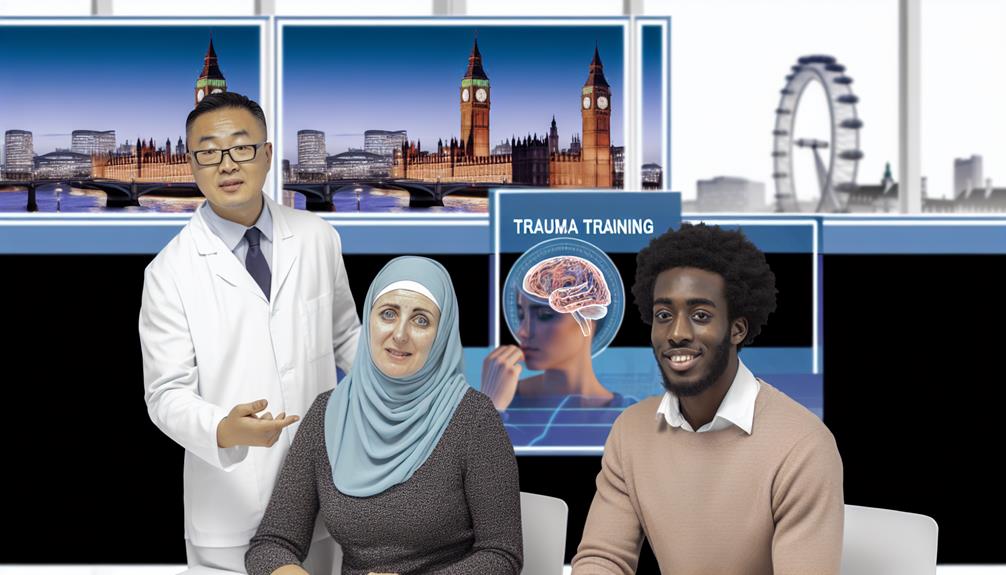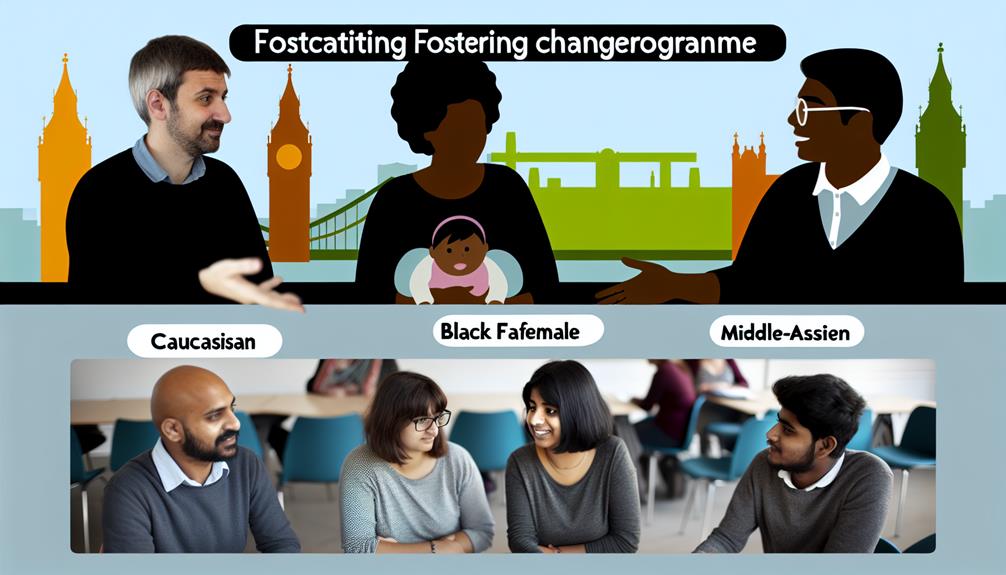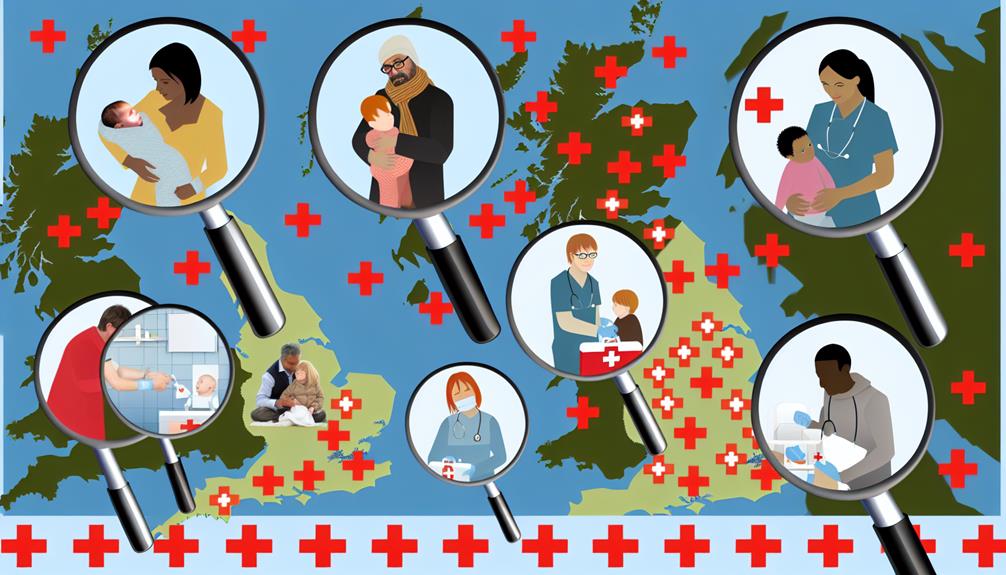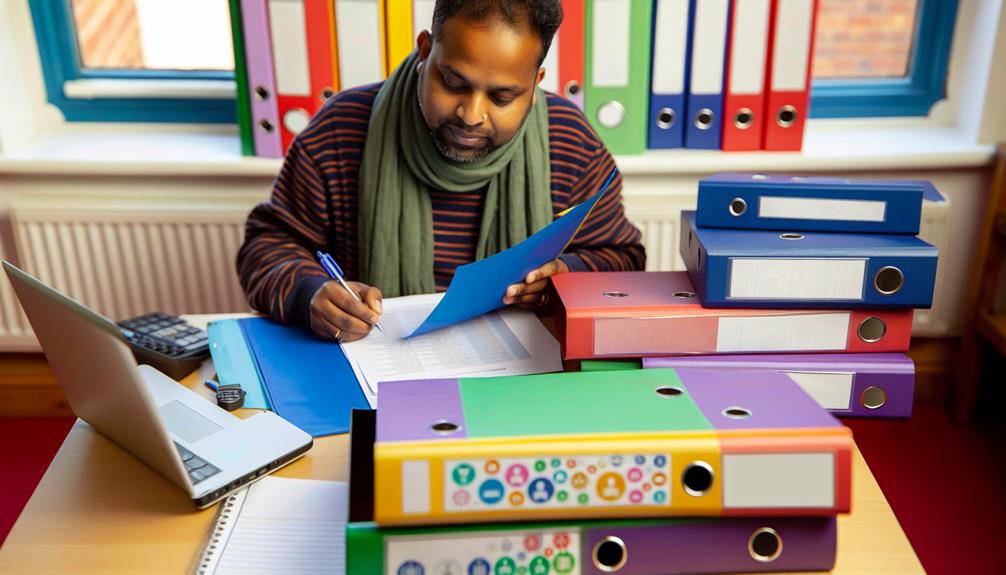The top 10 training programs for UK foster carers include Understanding Trauma Training, Skills to Foster Programme, Attachment Theory Courses, and Child Development Certification. The Fostering Changes Programme offers flexible learning, while First Aid Training guarantees you're ready for emergencies. Managing Behaviour Workshops assist in dealing with challenging actions and Record Keeping and Reporting guarantees transparency. Finally, Resilience Building Training equips you to cope with stress. Each course enhances your ability to provide utmost care to your foster child. There's a wealth of knowledge waiting for you in these programmes – why not start exploring?
Key Takeaways
- "Understanding Trauma Training" equips carers with strategies to identify and manage trauma in foster children.
- "Skills to Foster Programme" provides practical knowledge and tools to promote positive behavior and handle challenges.
- "Attachment Theory Courses" offer insights into emotional needs and caregiver-child dynamics, crucial for foster child development.
- "Child Development Certification" helps carers to identify and manage any developmental delays or challenges in foster children.
- "Fostering Changes Programme" enhances understanding of foster child challenges and provides skills for effective fostering.
Understanding Trauma Training

To effectively support foster children, it's important that you, as a foster carer, undergo 'Understanding Trauma Training' to gain insight into the complex emotional experiences these children often face. This training equips you with trauma identification strategies, critical for recognizing signs of trauma in children under your care. Early recognition enables timely intervention, preventing further psychological harm and promoting healing.
The 'Understanding Trauma Training' also introduces you to therapeutic care approaches. These are specific, trauma-informed strategies that you can apply in your daily interactions with foster children. They're designed to create a safe, nurturing environment that encourages positive emotional development, despite previous traumatic experiences.
Skills to Foster Programme
Another vital training you'll encounter as a UK foster carer is the 'Skills to Foster Programme'. This extensive course is specifically designed to equip you with the practical knowledge and tools needed to navigate the intricate world of foster care. It's not just about understanding the children's needs, but about mastering the skills to effectively meet these needs.
The programme effectiveness is evident in its content, which covers a variety of topics from promoting positive behavior to handling everyday challenges. This wide-ranging spectrum of training ensures you're well-prepared to provide the best possible care for the children entrusted to you.
Perhaps one of the most valuable aspects of the 'Skills to Foster Programme' is its emphasis on foster engagement. You'll take part in interactive sessions, real-life scenarios, and group discussions. This interactive approach not only gives you a sense of community but also allows you to learn from the experiences of others. It cultivates a deeper understanding of the role, responsibilities, and rewards of being a foster carer.
Attachment Theory Courses

As a foster carer in the UK, you'll also have access to 'Attachment Theory Courses', essential for understanding and supporting the emotional needs of foster children. These courses explore different attachment styles, helping you grasp how children form emotional bonds, and how disruptions to these bonds can impact their development and behaviour.
A key component of these courses is the 'Secure Base Model'. This model promotes the idea of a caregiver as a secure base from which a child can investigate their world, return to for comfort, and look to for guidance. By understanding this model, you can provide a stable and secure environment that nurtures a child's emotional and psychological growth.
The knowledge gained from 'Attachment Theory Courses' equips you to better respond to the emotional needs of foster children. In turn, you'll be able to build stronger, healthier relationships with your foster children, contributing significantly to their wellbeing and development. Remember, your role as a foster carer isn't just about providing a home, it's about offering a secure base for a child to thrive.
Child Development Certification
Building on your knowledge of attachment theory, you'll also find great benefit in obtaining a 'Child Development Certification'. This certification offers a profound understanding of the physical, cognitive, social, and emotional development of children. It's an essential resource that equips you to provide appropriate care and guidance, pivotal in a foster setting.
You'll get to explore various pedagogical strategies that facilitate learning and development. Integrating these strategies into your daily interactions will foster an environment conducive to the child's overall growth. The certification also delves into assessment techniques, allowing you to track and monitor the child's progress effectively.
Furthermore, this certification provides insights into developmental milestones and potential deviations. It will arm you with the ability to promptly identify any developmental delays or challenges, ensuring timely intervention.
Fostering Changes Programme

You're now ready to explore the Fostering Changes Programme, a key training initiative for UK foster carers. This program offers significant benefits, aimed to equip foster carers with crucial skills and knowledge.
We'll discuss these benefits and the essential components of the training in the following discussion.
Program Benefits
One can harvest considerable benefits from the Fostering Changes Programme, designed to equip UK foster carers with the necessary skills and knowledge for effective fostering. Your success is facilitated through the program's accessibility and the lasting validity of the certification you'll receive.
- The programme's accessibility allows flexibility, making it easier for you to balance your personal and professional responsibilities.
- Certification validity guarantees that your training is recognized and respected across the UK's fostering community.
- You'll gain a solid understanding of the challenges children in foster care face, and how to support them effectively.
- The practical strategies you learn will boost your confidence in your fostering role.
- You'll be part of a supportive community, sharing experiences and learning from other foster carers.
These advantages can greatly enhance your fostering journey.
Training Components
Diving into the core components of the Fostering Changes Programme, you'll find it's designed to instill key skills and knowledge in several areas essential to successful fostering. It emphasizes on practical parenting skills, understanding child development, and managing challenging behavior.
Training evaluation is integral, appraising your progress and identifying areas for improvement. This guarantees you're on the right track, building your confidence as a foster carer.
The program also embraces individualized learning, acknowledging that every foster child and carer is unique. By tailoring the training to your needs and those of your foster child, it ensures the best possible outcomes.
Safe Caring Training
As we move onto 'Safe Caring Training', it's essential for you to grasp the importance of implementing safety protocols and understanding emotional boundaries. These factors play a pivotal role in ensuring a secure and nurturing environment for the child.
Let's examine how these can be effectively integrated into your foster care practice.
Implementing Safety Protocols
You'll find that implementing safety protocols through Safe Caring Training is a crucial aspect of foster care training programs in the UK. As a foster carer, mastering this area equips you with the necessary skills to create a safe environment for your foster child.
Key facets of this training include:
- Understanding the importance and use of safety equipment in various scenarios.
- Conducting a thorough risk assessment.
- Learning about potential hazards in the home and how to mitigate them.
- Understanding and responding appropriately to emergencies.
- Incorporating safety routines into the daily activities of the child.
Understanding Emotional Boundaries
In the area of Safe Caring Training, understanding the concept of emotional boundaries is vital as they play a pivotal role in nurturing healthy relationships with your foster child. Emotion regulation and boundary establishment are two key concepts you'll need to master.
| Emotion Regulation | Boundary Establishment |
|---|---|
| Helps manage emotional responses | Defines the limits of behavior |
| Equips your child to deal with their feelings | Protects the child's emotional and mental wellbeing |
| Promotes resilience and reduces stress | Builds trust and respect in relationships |
You'll learn to recognise and respond to your child's emotions, helping them navigate their feelings. Also, you'll gain skills to set healthy boundaries, ensuring your foster child feels secure, respected, and understood. This understanding fosters a safe and nurturing environment.
First Aid for Foster Carers

Often, foster carers are the first responders in a medical emergency, making first aid training an essential component of their preparation. Medical communication and emergency preparedness are key skills that you'll develop during such training.
To keep you engaged and help you master these critical skills, here are five key areas that first aid training for foster carers typically covers:
- Recognising signs of a medical emergency: This includes learning to identify symptoms that require immediate attention.
- Administering basic first aid: You'll get hands-on experience in handling common medical situations.
- CPR and AED use: These life-saving techniques are crucial in many emergencies.
- Emergency action planning: You'll learn to create a clear, actionable plan for medical emergencies.
- Effective communication in emergencies: This includes signalling for help, communicating the situation clearly, and liaising with medical professionals.
Managing Behaviour Workshops
Understanding the intricacies of child behavior is a key aspect of foster care. Managing behavior workshops provide the necessary tools and techniques to do so effectively. These workshops focus on teaching you how to manage various behavioral challenges that may arise, ensuring your comfort and confidence in handling these situations.
The effectiveness of these workshops is undeniable. They not only offer insight into the reasons behind certain behaviors but also equip you with practical strategies to address them. You'll learn to identify triggers, understand emotional responses, and develop strategies to defuse potentially challenging situations.
Workshops on behavior management are often led by experienced professionals who bring a wealth of knowledge and practical experience. They'll guide you through various scenarios, providing hands-on training that enhances your understanding and application of these behavior strategies.
Record Keeping and Reporting

Building on the skills you've gained from managing behavior workshops, let's now turn our attention to another important aspect of foster care – maintaining accurate records and reporting.
Record keeping and reporting are crucial in helping you track the progress of your foster child, provide essential information for reviews, and maintain transparency with your fostering service. It's not just about jotting down notes, it also involves understanding:
- The importance of data confidentiality and how to uphold it
- How to structure reports for clarity and comprehension
- The types of information that should be documented
- The significance of timely and precise reporting
- The legal obligations related to record keeping in foster care
Mastery of these aspects will guarantee you're providing the best possible care, while also complying with the necessary legal requirements. Effective record keeping and report formatting can be the difference between a well-managed case and one that slips through the cracks. It's a skill worth honing and a knowledge base worth growing. And remember, it's not just paperwork, it's a child's life story.
Resilience Building Training
Let's immerse ourselves in the next critical training area for foster carers – resilience building training. As a foster carer, you'll encounter challenges that require tenacity and adaptability. This training equips you with resilience strategies to handle these challenges effectively.
Resilience is your ability to bounce back from tough situations. It's about staying positive and continuing to provide quality care, even when things get tough. Resilience building training offers you tools to develop this critical skill. You'll learn techniques to maintain your emotional well-being, tackle stress, and keep your composure in the face of adversity.
Stress management is an integral part of resilience training. The role of a foster carer can be stressful, so it's essential to know how to manage this stress effectively. The training will guide you on how to identify signs of stress, develop coping strategies, and maintain a healthy work-life balance.
Frequently Asked Questions
What Is the Typical Duration of These Training Programs for UK Foster Carers?
Typically, the duration of your training depends on the training content and program evaluation. However, most UK foster carer training programs tend to run between a few days to several weeks.
Who Are the Accredited Bodies That Certify These Training Programs?
You're asking about the accrediting bodies for these training programs. They're usually certified by government organisations, ensuring the accreditation process follows strict training standards for the best possible preparation of UK foster carers.
Are There Any Online Options for These Training Programs?
Yes, there are online options available, offering program flexibility and digital accessibility. You'll find a majority of the top training programs for foster carers have adapted to provide education in a virtual environment.
Can These Training Programs Be Taken by Individuals Who Are Not Currently Foster Carers, but Are Interested in Becoming One?
Yes, you can take these programs even if you're not a foster carer yet. They help with the change process and clarify program eligibility, providing essential knowledge for prospective foster carers like yourself.
Is There Any Financial Aid or Scholarships Available for These Training Programs?
Yes, funding options are available for such training programs. You'll need to check each program for specific scholarship eligibility. Often, these aids are designed to help potential carers get the training they need.
Conclusion
You might be thinking, 'Can I really handle this?'
With these top 10 UK training programs, you're fully equipped to become a successful foster carer. Understanding trauma, mastering necessary skills, and building resilience are just a few areas these courses cover. They're designed to support you, ensuring every child in your care gets the best possible start.
So, don't hesitate. Invest in these trainings today – you have what it takes to make a difference.




